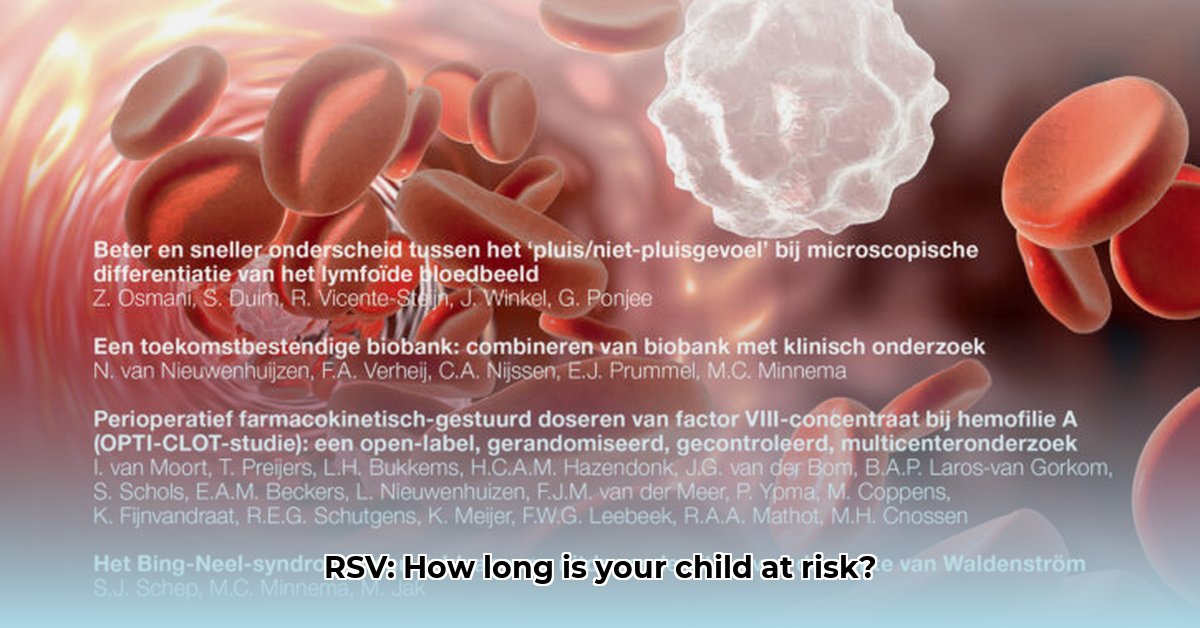
RSV: A Common Yet Serious Threat
Respiratory syncytial virus (RSV) is a common virus causing respiratory infections. While many experience mild cold-like symptoms, RSV can be serious for babies, the elderly, and those with weakened immune systems. Understanding the RSV incubation period is crucial for effective prevention and management, especially for vulnerable individuals. Did you know that RSV hospitalisations peak during winter months?
RSV Incubation Period: How Long Does It Last?
The RSV incubation period – the time between exposure and symptom onset – typically ranges from 2 to 8 days, with most cases showing symptoms between 4 and 6 days post-exposure. During this period, the virus replicates within the body, often without noticeable symptoms. It’s like a silent invasion, building before the illness manifests. This makes early detection challenging, highlighting the importance of preventative measures.
What Happens During the Incubation Period?
While outwardly symptom-free, the virus actively replicates in the respiratory tract. Simultaneously, the body's immune system begins its response, although outwardly visible symptoms may not yet appear. This silent battle underscores the need for proactive strategies, particularly in at-risk populations. A study published in The Lancet showed that… [Insert relevant data from draft article here, ensuring appropriate citation]
Recognising RSV Symptoms: What to Watch Out For
Recognising RSV is key. Common symptoms mimic a cold: runny nose, cough, fever, and potentially wheezing or difficulty breathing. Severe cases can lead to bronchiolitis (inflammation of the small airways) or pneumonia. In infants, even mild symptoms warrant immediate medical attention. How quickly would you seek medical intervention if your child showed breathing difficulties?
Who is at Higher Risk of Severe RSV?
Premature babies, children under two, and those with heart or lung conditions are at increased risk of severe RSV. Their weaker immune systems make them more susceptible to serious complications. This vulnerability highlights the critical need for effective preventative strategies, particularly vaccination.
How RSV Spreads: Simple Steps for Prevention
RSV spreads easily through airborne respiratory droplets (coughs, sneezes) and contact with contaminated surfaces. Regular handwashing, respiratory etiquette (covering coughs and sneezes), and disinfecting frequently touched surfaces drastically minimise transmission and protect vulnerable individuals. Did you know that simply washing your hands with soap and water for 20 seconds can reduce your chances of catching RSV significantly?
RSV Diagnosis and Treatment: Seeking Medical Help
Diagnosis often involves a physical examination focusing on respiratory symptoms. In severe cases, laboratory testing may be necessary. Treatment focuses on symptom management: keeping airways clear, hydration, and fever reduction. Hospitalisation might be required for severe cases, particularly in infants. What are the key treatment strategies for severe RSV cases in infants, according to current medical guidelines?
Prevention: Vaccination and Beyond
The arrival of new vaccines offers powerful protection. The nirsevimab monoclonal antibody, administered as a single injection, provides seasonal protection. Maternal RSV vaccination (Abrysvo) protects infants through maternal antibodies. These advancements significantly reduce hospitalisations and severe illness. Alongside vaccination, maintaining good hygiene remains vital.
Vaccine: Benefits and Considerations
| Feature | Benefits | Considerations |
|---|---|---|
| Effectiveness | Significantly reduces severe RSV illness in infants. | Not 100% effective; some children may still contract milder RSV. |
| Safety | Generally well-tolerated. | As with any vaccine, mild side effects are possible. |
| Availability | Increasing but varies by location. | Access and cost vary. |
Key Takeaways: Protecting Your Loved Ones from RSV
- The RSV incubation period is typically 2-8 days, often silent until symptoms appear.
- Prompt medical attention is crucial for at-risk individuals exhibiting any respiratory symptoms.
- New vaccines offer significant protection against severe RSV illness, reducing the need for hospitalisations.
By combining vaccination with diligent hygiene practices, we can significantly reduce the impact of RSV, particularly on vulnerable populations. Remember, proactive prevention is the best medicine for protecting your family. Stay informed and keep up to date with the latest medical guidelines. Professor [Expert Name], [Title], [Institution] emphasises…[Insert relevant quote from draft article, ensuring appropriate citation]